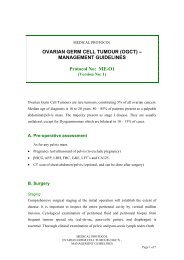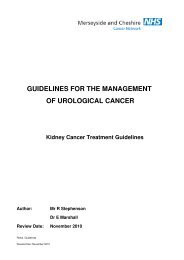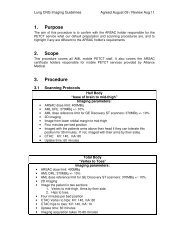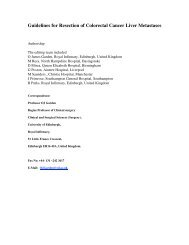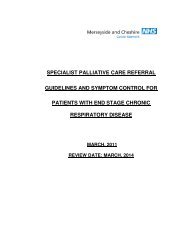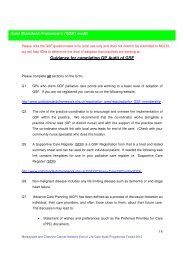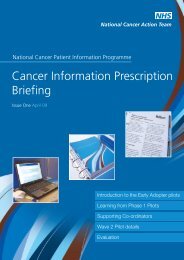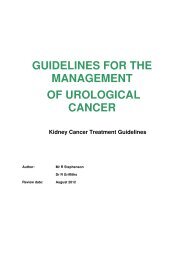Cancer Reform Strategy - NHS Cancer Screening Programmes
Cancer Reform Strategy - NHS Cancer Screening Programmes
Cancer Reform Strategy - NHS Cancer Screening Programmes
- No tags were found...
Create successful ePaper yourself
Turn your PDF publications into a flip-book with our unique Google optimized e-Paper software.
78 CANCER REFORM STRATEGY●●●●●Communication and information;Delivering treatment (such as chemotherapy);Psychological and emotional support forpatients and families;Providing continuity of care;Supporting and advising patients’ familiesand carers; andadvanced practitioners and independentprescribers.5.47 Commissioners and providers shouldtherefore give particular consideration tothe role of clinical nurse specialists. Goodcommissioners will use the peer reviewdata to benchmark their local CNS provisionagainst that of similar PCTs and take actionwhere the CNS workforce is found to beinsufficient.●Developing a post treatment plan.5.43 Over the past decade there has been asignificant expansion in the numbers of CNSs.However, there is more to do. For certain cancertypes, upwards of 20% of MDTs currently donot have CNS cover. These include some lung,urology, gynaecology and upper GI teams.Training to improve the patientexperience5.48 All those involved in delivering care andsupport to cancer patients need appropriatetraining. To deliver the vision set out in thischapter, it will be important to ensure thathigh quality training is available to equiphealthcare professionals to:5.44 Data indicate that substantial variation in thenumber of clinical nurse specialists available tosupport cancer patients at key points in the cancerpathway still exists across cancer networks. 29There can be a significant variation in theprovision of CNSs between cancer networks.This cannot simply be explained by geographicaldifferences in cancer incidence or patient flows.●●●Deliver information to patientseffectively;Work as part of an integratedmultidisciplinary team;Engage in appropriate ‘what if’conversations;5.45 A recent report by the Prostate <strong>Cancer</strong>Charter for Action identified that there is alsosignificant variation in provision of CNSsbetween different tumours, resulting insignificant variations in the average caseload fora CNS. 30 For example, breast cancer andgynaecology nurse specialists have the lowestmean caseloads of 78 patients per whole timeequivalent CNS and lung cancer and urologynurse specialists have the highest meancaseloads at 123 and 132 patients per wholetime equivalent nurse respectively. 31 There areevident shortfalls in the number of clinical nursespecialists available to support patients withurological, lung and upper GI cancers.5.46 The CNS’ role may also need to adapt overtime to reflect new treatments and care settingsand changes in patient needs. Innovativesolutions to improving patient experience shouldbe explored such as the development of more●●To assess and manage/respond to theneeds of cancer survivors; andIn the case of CNSs, provide effectivepsychological support.5.49 Commissioners and providers will need torecognise the importance of this if they are todeliver improvements in the experience ofpeople living with and surviving cancer. Chapter11 sets out how we will approach trainingneeds in the future.Helping patients meet the costsof cancer5.50 <strong>Cancer</strong> can also significantly affect aperson’s finances. A Macmillan <strong>Cancer</strong> Supportsurvey in 2006 found that 70% of cancerpatients incurred travel costs. Based on theaverage number of trips, the cost per patientwas estimated to be £325. Other costs to



